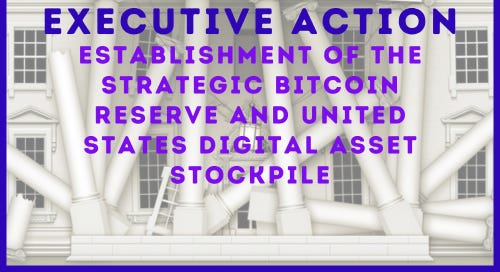Establishment of the Strategic Bitcoin Reserve and United States Digital Asset Stockpile
Analysis of Trump’s Executive Order
Overview:
This executive order establishes the Strategic Bitcoin Reserve (SBR) and a broader U.S. Digital Asset Stockpile as part of a national effort to integrate digital assets into the country’s financial and strategic reserves. The administration argues that holding Bitcoin and other digital assets will strengthen financial security, hedge against inflation, and position the U.S. as a global leader in blockchain technology. While proponents see this as a forward-thinking approach to financial sovereignty, critics warn that it may introduce volatility into national reserves, increase cybersecurity risks, and favor speculative investment over regulatory stability.
Detailed Analysis:
Creation of the Strategic Bitcoin Reserve (SBR):
Policy: Directs the Department of the Treasury to acquire and maintain a significant stockpile of Bitcoin as part of U.S. strategic financial reserves.
Progressive Concern:
Volatility Risks: Bitcoin’s price fluctuations could create instability in government reserves, unlike traditional assets such as gold or fiat currency.
Potential for Market Manipulation: Government ownership of large amounts of Bitcoin could influence market prices, potentially benefiting private holders and institutional investors disproportionately.
Environmental Impact: Bitcoin mining is energy-intensive, and increased government involvement may incentivize further expansion of mining operations, exacerbating carbon emissions.
Establishment of the U.S. Digital Asset Stockpile:
Policy: The federal government will accumulate various digital assets, including stablecoins and other cryptocurrencies, to ensure national competitiveness in the blockchain economy.
Progressive Concern:
Lack of Regulatory Framework: Without clear digital asset regulations, holding a stockpile of cryptocurrencies could expose the government to fraud, hacking, and financial instability.
Potential for Favoritism in Asset Selection: Which cryptocurrencies are included in the stockpile, and who decides? If private companies lobby for inclusion, this could lead to conflicts of interest.
Impact on Dollar Stability: Large-scale government investment in digital assets may undermine confidence in the U.S. dollar, weakening its global position as the reserve currency.
Geopolitical and Economic Implications:
Policy: The U.S. will use its digital asset reserves to hedge against inflation and strengthen financial independence from foreign economic policies.
Progressive Concern:
Increased Economic Uncertainty: Using Bitcoin as a hedge against inflation could backfire if its value drops significantly, resulting in losses for the U.S. economy.
Global Perception of U.S. Financial Policy: This move may signal a shift away from traditional finance and central banking, creating uncertainty in international markets and among U.S. allies.
Potential for Financialization of Public Funds: Instead of investing in infrastructure, education, or social services, public funds could be redirected into speculative assets that primarily benefit private stakeholders.
Historical Context:
Bitcoin’s Price History: Bitcoin has experienced extreme volatility, with price swings of over 50% within months. Holding it as a reserve asset carries significant financial risks.
Central Banks and Digital Currencies: While some governments (e.g., China with its digital yuan) are exploring digital currencies, no major nation has yet moved to hold Bitcoin as a reserve asset.
Previous U.S. Stances on Crypto Regulation: The Biden administration prioritized cryptocurrency regulations and enforcement, whereas Trump’s previous stance was skeptical of Bitcoin’s role in the economy.
Broader Implications:
Risk of Increased National Debt: If the government purchases Bitcoin at high prices and the value drops, taxpayers could bear the financial burden of losses.
Cybersecurity Concerns: A government-controlled digital asset stockpile could become a prime target for cyberattacks, putting national financial security at risk.
Influence on Global Crypto Adoption: The U.S. embracing digital assets could encourage other nations to do the same, potentially reshaping global financial systems.
Social Media Posts:
Post 1: The U.S. government is creating a Bitcoin reserve—but at what cost? Crypto volatility could put taxpayers at risk while benefiting wealthy investors. Read more: https://www.whitehouse.gov/presidential-actions/2025/03/establishment-of-the-strategic-bitcoin-reserveand-united-states-digital-asset-stockpile/ #CryptoRisk #BitcoinReserve #FinancialStability
Post 2: Investing public funds in volatile digital assets like Bitcoin is reckless. The U.S. needs financial security, not speculation. #ProtectTaxpayers #StableEconomy #SmartFinance
Post 3: While innovation in blockchain is important, tying national reserves to Bitcoin could destabilize the economy. We need responsible digital asset policies, not risky bets. #CryptoRegulation #EconomicSecurity #BlockchainFuture



